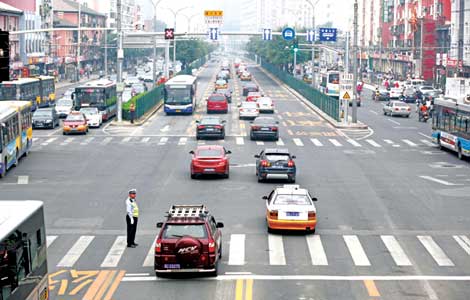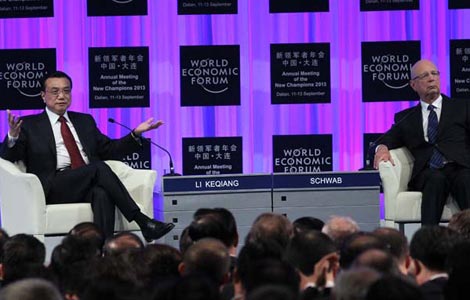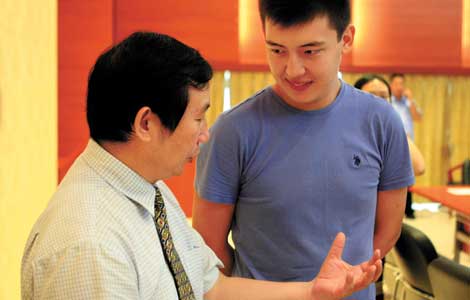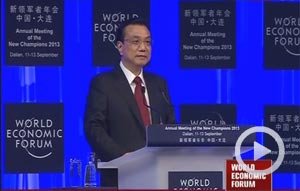Experts appeal for labelling GM food
Updated: 2013-09-12 15:21
(Xinhua)
|
||||||||
BEIJING - A war of words by two online celebrities has aroused a new round of debate on the safety of genetically modified (GM) food, with some experts appealing for the consumers' right to be informed when buying GM products.
Fang Zhouzi, a biochemist and vocal supporter of GM technology, led more than 20 volunteers eating GM corn on Saturday at an experimental field of corn of the China Agricultural University, and on Sunday, well-known talk show host Cui Yongyuan questioned Fang on microblog.
Following Cui's microblog postings, Fang refuted, and the dialogue grew heated, attracting many netizens and experts into the discussion.
As GM food remains controversial worldwide, and the debate did not come to any agreement, but consumer awareness of GM products, with the gradual flows of such products into our daily lives, has been heightened by the exchange.
According to the International Service for the Acquisition of Agri-biotech Applications, 28 countries have planted GM crops, and on the planet 81 percent of soybeans, 35 percent of corn and 30 percent of oilseed rape are GM products.
"In China, more than half of cooking oil consumption is soybean oil, and 90 percent of that oil is made from GM soybeans," said Wang Xiaoyu, deputy secretary general of the soybean association of Heilongjiang province.
"People have the right to know what they are eating and the choice of whether to have GM food should be left up to them," said Cheng Tongshun, doctoral supervisor with the Zhou Enlai School of Government at Nankai University.
"Consumers' right to be informed and freedom of choice should be safeguarded," Cheng added.
Although China has a strict trademark mechanism for GM products, including clear labeling, many transgenetic products are still without such labels.
Xinhua reporters found cooking oil products of well-known brands labeled GM or non-GM in several big supermarkets in Beijing and Tianjin, with non-GM especially evident.
For other products, including soy sauce and soy milk, such marks are not regularly seen on the labels, especially for those made by less popular manufacturers.
A salesman for a grain and oil foreign invested enterprise, who would only gave his surname as Zuo, said that soy sauce makers buy transgenetic beans from him to reduce costs, with GM soybeans at 4,260 yuan (around 700 U.S. dollars) per tonne and non-GM soybeans more than 5,000 per tonne. Some soybean sauce makers do not label transgenetic soybeans.
Xinhua reporters also found that nearly all fresh agricultural products lack GM information, although some fresh transgenetic agricultural products are popular at local markets.
"China should borrow the experience of managing GM products from developed countries and further regulate and improve them," suggested Wang Junping, professor at Tianjin University of Science and Technology.
Liu Junhai, a professor at Renmin University of China, said business operation, supervision, food and drug safety and health departments should cooperate to set up a network of sharing information on transgenetic products.
"Such a network could alleviate people's fears as the information would be transparent and could be examined," Liu added.

 Plenty of fizz
Plenty of fizz
 Traffic about-face seeks to ease congestion
Traffic about-face seeks to ease congestion
 Another iPhone4 explodes while charging
Another iPhone4 explodes while charging
 Premier stresses transformation of the economy
Premier stresses transformation of the economy
 Soyuz capsule returns from space station
Soyuz capsule returns from space station
 China's Christian churches reduce leaders' age ceiling
China's Christian churches reduce leaders' age ceiling
 Student's rare blood bonds Kazakhstan and China
Student's rare blood bonds Kazakhstan and China
 Apple's low-end phone price disappointing
Apple's low-end phone price disappointing
Most Viewed
Editor's Picks

|

|

|

|

|

|
Today's Top News
US moves against China firms criticized
3 sentenced to death for Xinjiang terror attack
Xi welcomes talks on Iran
Assad agrees to hand over chemical weapons
Time of opportunities, challenges
China sets caps for rare earths exploration
Ending non-tariff barriers benefits global economy
Developing nations need shift to balanced growth
US Weekly

|

|






